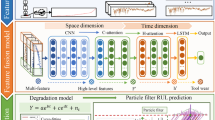Abstract
With the integration of manufacturing and the new generation of information technology, it becomes possible to utilize quality prediction technology instead of inspection technology. This paper focuses on achieving efficient product quality prediction by utilizing various relevant data from the product production process to overcome the limitations of manual quality inspection. Aiming to address the issues related to one-sided information of unimodal data and the close relationship between abnormal fluctuations in the production process and quality problems, a product quality prediction model called MAETAFormer is proposed. This model is based on the attention mechanism of anomalous energy tracking. It enhances the information of anomalous energy through the wavelet transform and a focusing module that targets sparse high-frequency anomalous fluctuations. The model further integrates the anomalous energy using an attention mechanism between the dual streams of time series data and image data. Finally, it deeply fuses the two modalities through the bilinear pooling module. The model is tested on the collected Strand Multimodal Dataset and demonstrates superior performance compared to advanced multimodal networks like LXMERT.
Access this chapter
Tax calculation will be finalised at checkout
Purchases are for personal use only
Similar content being viewed by others
References
Chien, C., Trappey, A., Wang, C.: ARIMA-AdaBoost hybrid approach for product quality prediction in advanced transformer manufacturing. Adv. Eng. Inform. 57, 102055 (2023)
Rehmer, A., Klute, M., Kroll, A., Heim, H.P.: An internal dynamics approach to predicting batch-end product quality in plastic injection molding using Recurrent Neural Networks. In: IEEE Conference on Control Technology and Applications, pp. 1427–1432. IEEE, Trieste (2022)
Ren, L., Meng, Z., Wang, X., Lu, R., Yang, L.T.: A wide-deep-sequence model-based quality prediction method in industrial process analysis. IEEE Trans. Neural Netw. Learn. Syst. 31(9), 3721–3731 (2020)
Vaswani, A., et al.: Attention is all you need. Adv. Neural Inf. Process. Syst. 30 (2017)
Zhang, G., Tang, Z., Fan, Y., Liu, J., Jahanshahi, H., Aly, A.A.: Steel wire rope surface defect detection based on segmentation template and spatiotemporal gray sample set. Sensors 21(16), 5401(2021)
Jiang, J., Jin, Z., Wang, B., Ma, L., Cui, Y.: A Sobel operator combined with patch statistics algorithm for fabric defect detection. KSII Trans. Internet Inf. Syst. 14(2), 687–701 (2020)
Qin, W., Wen, H., Li, F.: Fabric defect detection algorithm based on residual energy distribution and Gabor feature fusion. Vis. Comput. 39(11), 5971–5985 (2023)
Cui, Y., Lu, S., Liu, S.: Real-time detection of wood defects based on SPP-improved YOLO algorithm. Multim. Tools Appl. 82(14), 21031–21044 (2023)
Yang, J., Shi, Y., Qi, Z.: DFR: Deep feature reconstruction for unsupervised anomaly segmentation. Neural Comput. 424, 9–22 (2021)
Cohen, N., Hoshen, Y.: Sub-image anomaly detection with deep pyramid correspondences. Arxiv preprint arXiv:2005.02357 (2020)
Yu, Z., Yu, J., Fan, J., Tao, D.: Multi-modal factorized bilinear pooling with co-attention learning for visual question answering. In: IEEE International Conference on Computer Vision, pp.1821–1830. IEEE, Venice (2017)
Lu, J., Batra, D., Parikh, D., Lee, S.: Vilbert: pretraining task-agnostic visiolinguistic representations for vision-and-language tasks. Adv. Neural Inf. Process. Syst. 32 (2019)
Tan, H., Bansal, M.: Lxmert: learning cross-modality encoder representations from transformers. arXiv preprint arXiv:1908.07490 (2019)
Chen, Y.C., et al.: Uniter: universal image-text representation learning. In: European Conference on Computer Vision, pp.104–120. Springer, Glasgow (2020)
Kim, W., Son, B., Kim, I.: Vilt: vision-and-language transformer without convolution or region supervision. In: International Conference on Machine Learning, pp. 5583–5594. PMLR (2021)
Acknowledgments
The authors have no competing interests to declare that are relevant to the content of this article.
Author information
Authors and Affiliations
Corresponding author
Editor information
Editors and Affiliations
Rights and permissions
Copyright information
© 2024 The Author(s), under exclusive license to Springer Nature Singapore Pte Ltd.
About this paper
Cite this paper
Li, H., Zhang, Q., Li, W., Liang, X. (2024). Multi-modal Quality Prediction Algorithm Based on Anomalous Energy Tracking Attention. In: Huang, DS., Zhang, C., Pan, Y. (eds) Advanced Intelligent Computing Technology and Applications. ICIC 2024. Lecture Notes in Computer Science(), vol 14876. Springer, Singapore. https://doi.org/10.1007/978-981-97-5666-7_13
Download citation
DOI: https://doi.org/10.1007/978-981-97-5666-7_13
Published:
Publisher Name: Springer, Singapore
Print ISBN: 978-981-97-5665-0
Online ISBN: 978-981-97-5666-7
eBook Packages: Computer ScienceComputer Science (R0)




